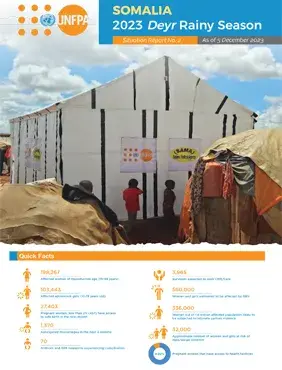Somalia's humanitarian crisis has intensified due to severe flooding induced by El Niño. Heavy rains and flooding now affect a broader expanse of Somalia, encompassing 33 out of 74 districts, a significant increase from 21 districts reported two weeks ago. The toll has been grave, with approximately 100,000 lives lost, including women and children, as of the latest update on November 17, 2023. The newly affected districts predominantly lie in the South-West, Hirshabelle, Jubaland states, and the Banadir Region.
The expanding emergency has impacted at least 862,029 people across Somalia, resulting in 695,000 displacements from their homes—an escalation of 41,000 since November 17. The risk of further displacement looms large, with estimates of 81,000 in Puntland, 83,000 in Galmudug, 212,000 in South-West, 638,000 in Hirshabelle, and 607,000 in Jubaland States. Extensive areas of farmland have succumbed to the floods, properties lie in ruins, and vital infrastructure, including health facilities, road networks, and houses, has suffered damage. The forecast indicates the likelihood of more heavy rain in southern Somalia until the week ending November 28.
The FSNAU/WFP warns that livelihoods and lives are in jeopardy, projecting that 4.3 million people, constituting a quarter of Somalia's population, may face crisis-level hunger or worse by the end of 2023 and beyond. This perilous situation persists amid ongoing challenges of insecurity, conflict, underdevelopment, and weak institutions. The FAO echoes concerns, predicting that Somalia may continue to experience significant rainfall until the end of the first quarter of 2024, with profound repercussions for the entire population.
As the humanitarian crisis deepens and assistance dwindles, women and girls are increasingly vulnerable to GBV, unplanned pregnancies, sexual exploitation, and abuse. Access to family planning and reproductive and sexual rights becomes limited. Since October 2023, the Federal government of Somalia has declared a state of emergency, appealing to the international community for humanitarian assistance. The Prime Minister of Somalia, accompanied by the UN Humanitarian Coordinator and heads of UN agencies, has visited the worst-affected areas. They are collaboratively mobilizing resources, including boats, to facilitate the transportation of people, especially women and girls, trapped in their homes.


